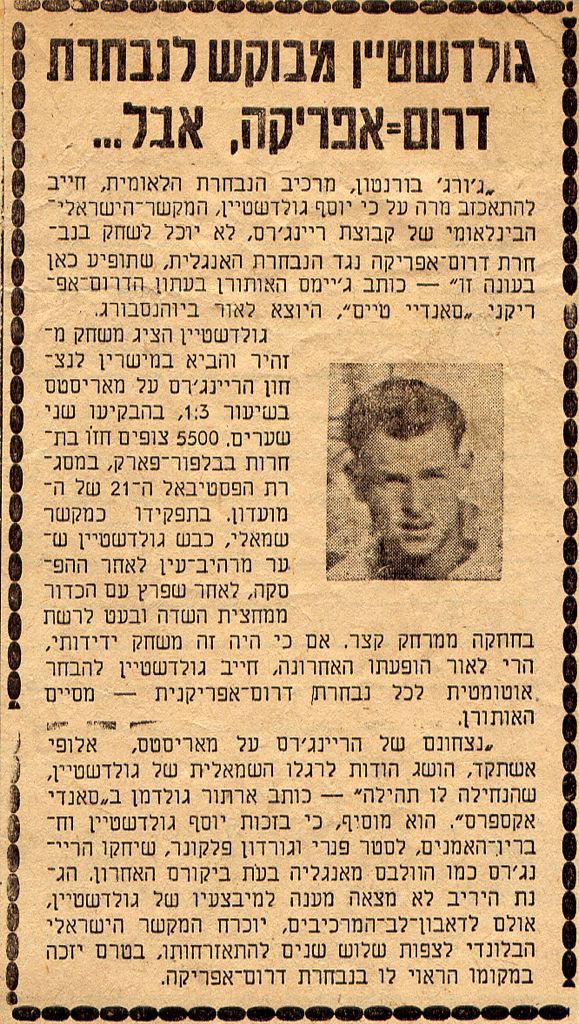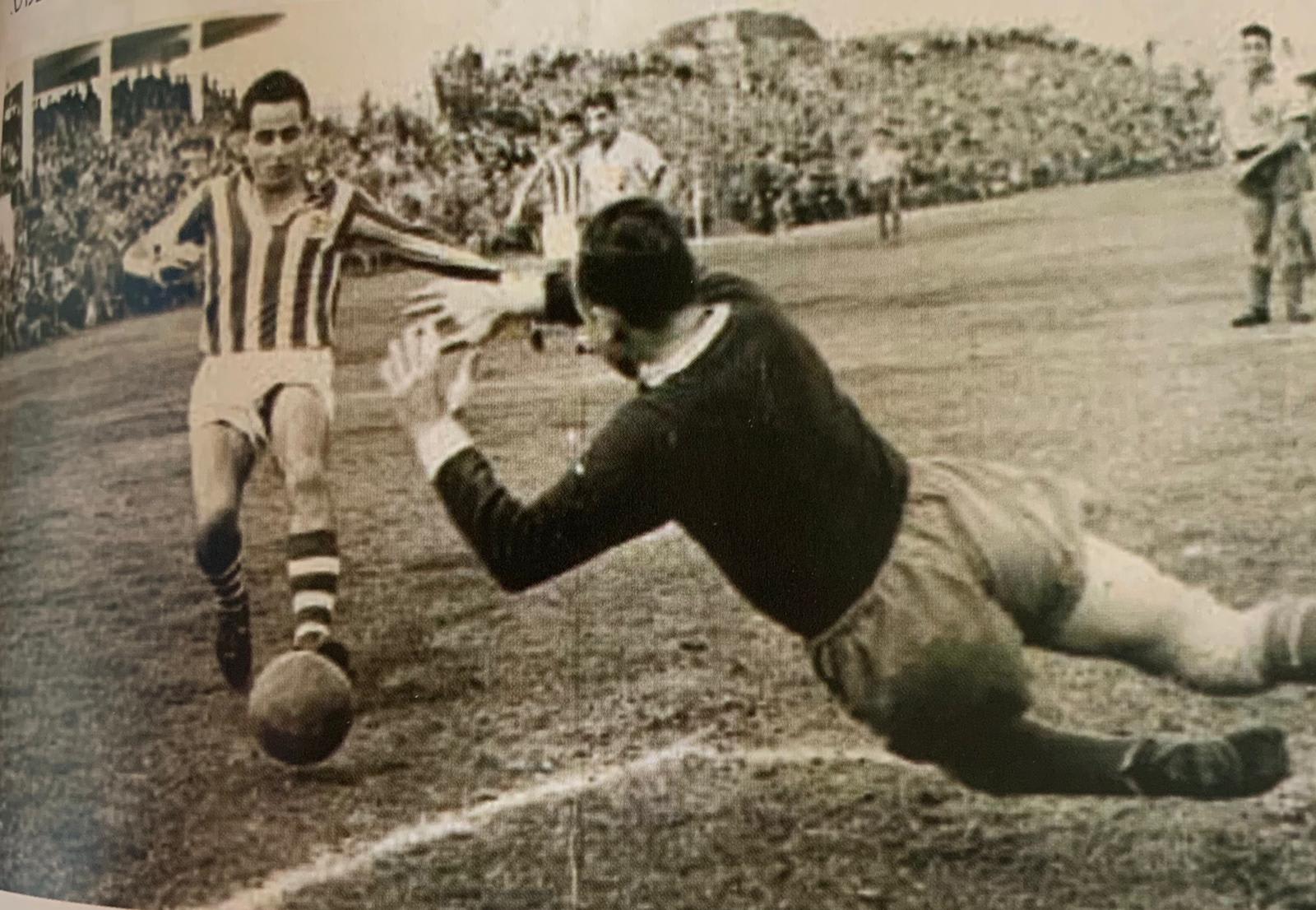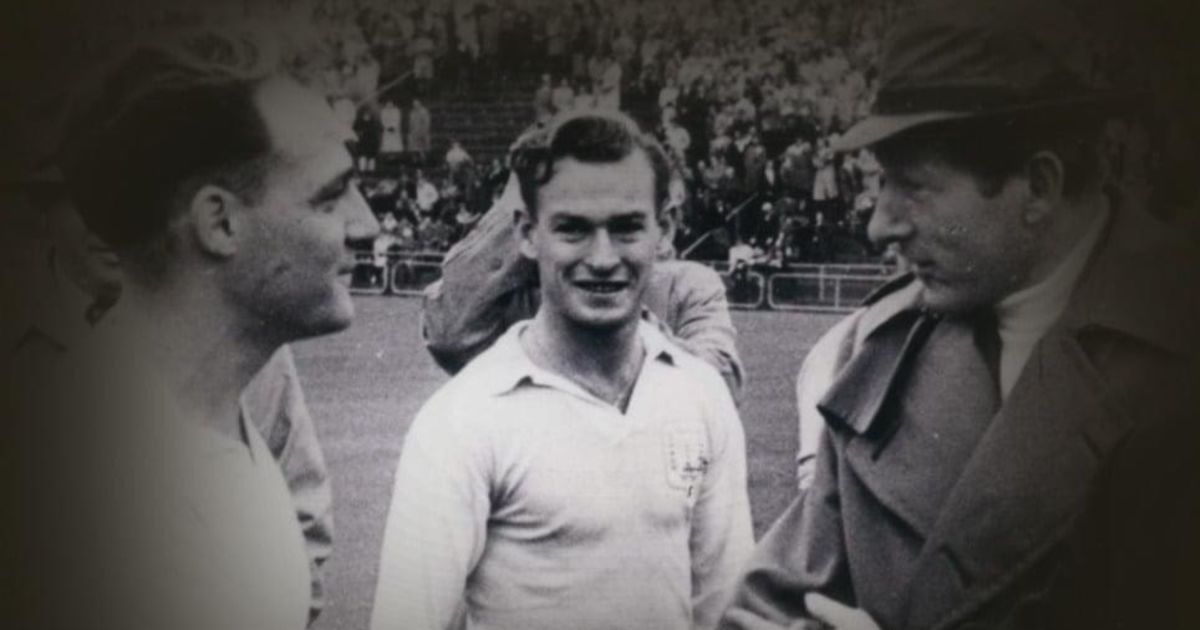Dor Peretz, Yonatan Cohen and Liel Abda are the prominent Israelis who fulfilled a dream last summer and moved to play football overseas. In stark contrast to today, in the beginning of the State of Israel, football in the Holy Land was amateur in the full sense of the word: players were not paid by their teams, contented themselves with finding jobs and of course had difficulty going out and playing abroad.
In April and May 1954, in the first years after the austerity period in Israel, the Israeli team conducted a dream tour of South Africa, where the players encountered an unfamiliar economic abundance and some secretly received tempting offers to move and play in many clubs in the country.
The players of the Israeli team returned to Israel with a variety of pampering gifts they received in South Africa, while additional gifts remained in Johannesburg due to the fact that there was no space on the plane. South Africa at the time was ruled by the right-wing National Party, which enshrined in law the discrimination and racial segregation between whites and blacks, known as “apartheid.”

After the team returned to Israel, two Maccabi Tel Aviv players – Yosef Marimovich and Yosef Goldstein – took off for England, where they played for the Jewish amateur team Wingate, while the two took advantage of the move and took a coaching course in London. The one who continued to woo Goldstein even during his time in London was the South African Rangers, who were considered a strong team, who submitted a re-offer to him. The Israeli returned to Israel and after three weeks of reserve in the IDF, boarded a plane without the knowledge of Maccabi Tel Aviv and secretly took off for Johannesburg.
After landing and the official release letter that was finally received from Maccabi Tel Aviv, Goldstein signed a semi-professional contract for two years with an option for another season in the ranks of Rangers, which played at the National Stadium, where Israel lost 2: 1 to the South African team in 1954. Goldstein’s new group was popular with the large Jewish community of the capital Johannesburg and some members of the management were Jews.
The South African Football League was semi-professional at the time, held mainly in the winter and played for about seven months. The new purchase from Israel was arranged for a part-time job at a local factory, where he served as employee manager and earned 500 South African rand a month. One rand was then equal to the British pound, when in Israel the average actual wage was 220 pounds. A huge difference. Goldstein lived in an apartment with partners, when the joint rent was 44 rand.

Professionally, Goldstein recorded the fastest goal in his new team that season in the league, scoring after about 60 seconds. At the same time and following his ability, the local association approached an Israeli and offered him to play for the South African team, but this did not succeed due to the fact that he had to be a citizen of the country for three years.
During his time in South Africa, Goldstein recommended to the leaders of his team to join the Hapoel Tel Aviv contact and the Israeli team, Asher Ballut. The contract with the Israeli was soon closed and Rangers sent him a flight ticket to Johannesburg. In previous conversations with Ballut, who passed away in 2019, he talked about the economic situation in Israel and revealed what led to the cancellation of the flight to South Africa hours before takeoff.

“The economic situation in Israel in the mid-1950s was difficult,” says Ballut. “I was an outstanding footballer for the Israeli team and Hapoel Tel Aviv, who arranged a job for me as a garbage truck driver in the Tel Aviv municipality. I would start work every morning at 04:00 and finish at 11:00. I also had a free lunch at the restaurant of one of the team’s fans “The salary at the time was low, I could not afford to invite my partner for hummus and trimmings.”
Ballot explained how the move to the Rangers fell: “I went to the Tamar cinema on Allenby Street, to pick up the plane ticket to Johannesburg. He asked me to have coffee with him and called Haim Globinski, who was a senior member of the football association and a key figure at the Hapoel Center. They offered me a prestigious and permanent job at the Mekorot water company and convinced me to give up the South African dream. “It was a dream to play in South Africa, but I did not regret my move. That evening I invited my partner Sarah to a sumptuous dinner.”
Back to Goldstein. After two years in the ranks of Rangers and despite tempting offers from Hapoel Tel Aviv, Maccabi Haifa and Hapoel Haifa, he returned to Maccabi Tel Aviv due to the illness of his father Eliyahu. Goldstein returned to Israel with 2000 rand, a sum that was quite significant in those days. Last year, Joseph Goldstein passed away at the age of 88.
Goldstein was the first Israeli footballer in South Africa, but for the next 15 years – until 1970 – a long list of Israeli footballers fulfilled their dream: Joshua Gayer, Rafi Levy, Leon Cubic, Emanuel Simendiris, Yitzhak Falshel, Motzi Leon, Daniel Danieli, Ezri Arlands, Shimon Cohen, Boaz Kaufman, Benjamin Belnero, Nehemiah Haliva and Moti Lubetzky. Eli Fox coached in South Africa for two years, with other players like Lupa Kadosh and Moshe Romano staying there but returning to Israel shortly after.
